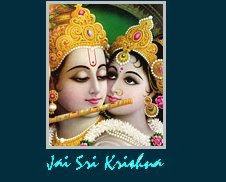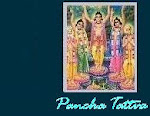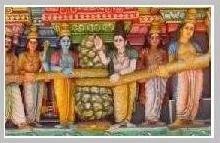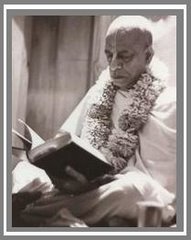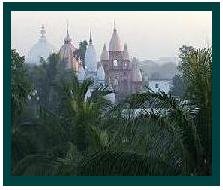Srila Jiva Gosvami explains diksa in his Bhakti-sandarbha (283) :divyam jnanam yato dadyat kuryat papasya sanksayamtasmat dikseti sa prokta desikais tattva-kovidaih
"Diksa is the process by which one can awaken his transcendental knowledge and vanquish all reactions caused by sinful activity. A person expert in the study of the revealed scriptures knows this process as diksa."
The gayatri-mantra gives all kinds of divya-jnana, transcendental knowledge, including the knowledge of krsna-tattva and jiva-tattva, and it also gives a relationship with Krsna. Nama alone will not give this relation to the person filled with anarthas. - Sri Caitanya-caritamrta: Madhya 15. 108 purp
All of our acaryas, from top to bottom, have stated that in order to purify us from our sinful actions and to clear offenses (anartha-nrvrtti) so that we can develop the ability to chant the pure name, we must accept diksa-vidhana (the process of initiation).
Di - ksa. Di means divya-jnana, or realized knowledge of our relationship with Krsna. Ksa is the washing away of all sins, aparadhas, and other impurities. For this, diksa-vidhana is essential. Without diksa-samskara, one's relationship with Krsna (sambandha-jnana) cannot manifest and one cannot chant suddha-nama. It is essential to accept diksa. yatha kancanatam yatikamsyam rasa-vidhanatahtatha diksa-vidhanenadvijatvam jayate nrnam
"As bell metal (a mixture of copper and tin) becomes gold by mixing with mercury, similarly, by the process of diksa, initiation, a person becomes a brahmana."( Sri Hari-bhakti-vilasa)
Bell metal turns into gold by the help of the element mercury in an al-chemical process. Similarly, by this element, the process of diksa, our chanting of the holy name will become pure; otherwise it is not possible.
If there is no necessity to accept diksa-mantra, why did Srila Bhaktisiddhanta Sarasvati Thakura Prabhupada take second initiation from Srila Gaurakisora dasa Babaji Maharaja, and why did he give diksa initiation to all of his disciples? If there is no necessity, why did Srila Prabhupada Bhaktisiddhanta Sarasvati Thakura give diksa initiation, and why did his disciples accept it?
Not only that, Brahma received kama-gayatri and gopal-mantra from Krsna Himself. Brahma then gave the diksa-mantra to Sri Narada Rsi, and Narada gave it to so many disciples. Narada not only gave harinama to Dhruva Maharaja; he gave him diksa by the mantra: om namo bhagavate vasudevaya. Sri Caitanya Mahaprabhu took initiation from Sri Isvara Puripada, who first gave Him harinama, and to purify that chanting of nama, he gave Him gopal-mantra. Gopal-mantra is transcendental and ever-existing, and it gives a relationship with Krsna as Gopijana-vallabha. We should consider all this evidence.All the acaryas in our guru-parampara have accepted second initiation from a bona fide guru.
Can those who say that harinama is sufficient for conditioned souls name any acarya in our guru-parampara who has not taken diksa initiation? Srila Gaurakisora dasa Babaji Maharaja, Srila Bhaktivinoda Thakura, Srila Visvanatha Cakravarti Thakura, and the Six Gosvamis took second initiation, and Srila Bhaktivedanta Swami Maharaj took it. Why did they take diksa initiation if it is not essential?
Sri Caitanya Mahaprabhu, Sri Nityananda Prabhu, Sri Advaita Acarya, Sri Gadadhara Pandita, Sri Isvara Puri, and Sri Madhavendra Puri have all taken diksa. Why, then, should we not take it? Why is it not essential? If it is not essential, then why did Sri Sanatana Gosvami write about it in his Sri Hari-bhakti-vilasa? Why did Sri Gopal Bhatta Gosvami also write about it? Did he say it was useless? Those who say that diksa is not essential will not be able to answer these questions in hundreds and millions of years.
Sri Caitanya Mahaprabhu took initiation even though he is the Lord of lords - Radha and Krsna combined - and yet He went to Gaya and took initiation. He vividly explained this fact in a gathering of sannyasis in Kasi when those sannyasis asked Him, "O, You are a very young and qualified sannyasi. Why do you not hear Vedanta? Why do you engage in singing and dancing and rolling on the ground? A sannyasi should not dance and do all these things.
" Sri Caitanya Mahaprabhu replied by telling them of the order of His guru, Sri Isvara Puripada:Mahaprabhu said, "Guru mora murkha dekhi - My Guru Maharaja told me that because I am foolish and unintelligent, I am not qualified to study Vedanta. He said that instead I should always chant Hare Krsna and I should remember this verse:harer nama harer namaharer namaiva kevalamkalau nasty eva nasty evanasty eva gatir anyatha(Caitanya Caritamrta Adi-lila 17.21)
"In this Age of Kali there is no other means, no other means, no other means for self-realization than chanting the holy name, chanting the holy name, chanting the holy name of Lord Hari."
But Sri Caitanya Mahaprabhu not only took harinama from His gurudeva; He also took second initiation through the gopal-mantra. In our parampara, in order to purify one's chanting and to and give the chanter a relationship with Krsna who has kindly taken the form of His holy name, the gopal-mantra is given along with harinama. Up until Caitanya Mahaprabhu's manifested pastimes only the gopal-mantra was given.
Later, Srila Dhyanacandra Gosvami and Srila Gopal-guru Gosvami gave the regulations we now follow. They gave brahma-gayatri, guru-mantra, guru-gayatri, gaura-mantra, gaura-gayatri, krsna-mantra (gopal-mantra) and finally kama-gayatri. This is the process followed in our sampradaya as begun by Srila Gopal-guru Gosvami, who is a disciple of Vakresvara Pandita, who is an associate of Sri Caitanya Mahaprabhu.
Caitanya Mahaprabhu quoted His gurudeva saying, "Krsna-mantra japa sada - ei mantra-sara. You must always chant the holy name of Krsna. This is the essence of all mantras, or Vedic hymns."krsna-mantra haite habe samsara-mocanakrsna-nama haite pabe krsnera carana
"Simply by chanting the holy name of Krsna one can obtain freedom from material existence. Indeed, simply by chanting the Hare Krsna mantra one will be able to see the lotus feet of the Lord."
The offenseless chanting of the holy name does not depend on the initiation process. But that name must be the pure name, and how will it become so? It can only become pure through that diksa process; otherwise it is not possible. It is not that the holy name is not pure, but if a person is not a pure devotee he cannot chant the pure name. He can only chant syllables that sound like the name. He can only chant offenses to the name (nama-aparadha) or a shadow of the name (nama-abhasa).
Sri Caitanya Mahaprabhu chanted the pure name, and therefore He was able to tell His gurudeva:kiba mantra dila, gosani, kiba tara balajapite japite mantra karila pagala
"'My dear lord, what kind of mantra have you given Me? I have become mad simply by chanting this maha-mantra!'"(Caitanya-caritamrta Adi 7.81)
Caitanya Mahaprabhu told the sannyasis, "You ask why I dance and sing and roll on the ground. Here is the reason: When My gurudeva initiated me, he gave me both the harinama mantra and the gopal mantra.
" Then He said, "japite japite mantra."
If He had only received harinama, the maha-mantra, He would not have said the word "mantra"? Mantra especially refers to gopal-mantra and kama-gayatri. He first received harinama and then gopal-mantra.
"Japite japite mantra karila pagala - and this made Me mad. Krsna nama mantra - meaning gopal and maha mantra made Him "like a madman".
For those who always remember and meditate on the gopal-mantra and kama-gayatri, by the power of the mantra, rati (bhava-bhakti) will at once enter their hearts. It has been written in Caitanya-caritamrta: Antya-lila 4.192: diksa-kale bhakta kare atma-samarpanasei-kale krsna tare kare atma-sama "At the time of initiation, when a devotee fully surrenders unto the service of the Lord, Krsna accepts him to be as good as Himself."
First initiation is called harinama initiation only, and the second initiation is called diksa. Atma samarpana - at the time of diksa the disciple totally surrenders unto the feet of his gurudeva. Sei-kale. At that time Krsna gives the shelter of His lotus feet, and He makes that disciple atma-sama, very near and dear to Him.
According to the Vaisnava regulative principles, one must be initiated as a brahmana. As quoted in the Hari-bhakti-vilasa (2.6) from the Visnu-yamala, Lord Sankara says to his wife Parvati: adiksitasya vamoru krtam sarvam nirarthakampasu-yonim avapnoti diksa-virahito janah"
O Vamaru - O beautiful Parvati. Regarding those who have not taken diksa, all their devotional activities, such as sadhana, bhajana, and puja, have all gone in vain. They are all useless. Such persons who are not properly initiated must again enter the many animals species.
"In addition, it has been told that nama can give everything, including Krsna-prema, simply by touching the tongue.
It is stated in Padyavali, a book compiled by Srila Rupa Gosvami: akrstih krta-cetasam su-manasam uccatanam camhasamacandalam amuka-loka-sulabho vasyas ca mukti-sriyahno diksam na ca sat-kriyam na ca purascaryam manag iksatemantro 'yam rasana-sprg eva phalati sri-krsna-namatmakah
"'The holy name of Lord Krsna is an attractive feature for many saintly, liberal people. It is the annihilator of all sinful reactions and is so powerful that, it is readily available to everyone, including the lowest type of man, the candala. The holy name of Krsna is the controller of the opulence of liberation, and it is identical with Krsna.
When a person simply chants the holy name with his tongue, immediate effects are produced. Chanting the holy name does not depend on initiation, pious activities or the purascarya regulative principles generally observed before initiation. The holy name does not wait for any of these activities. It is self-sufficient.' - Sri Caitanya-caritamrta Madhya 15.110
 Notes from Journal - 2008
Notes from Journal - 2008

































